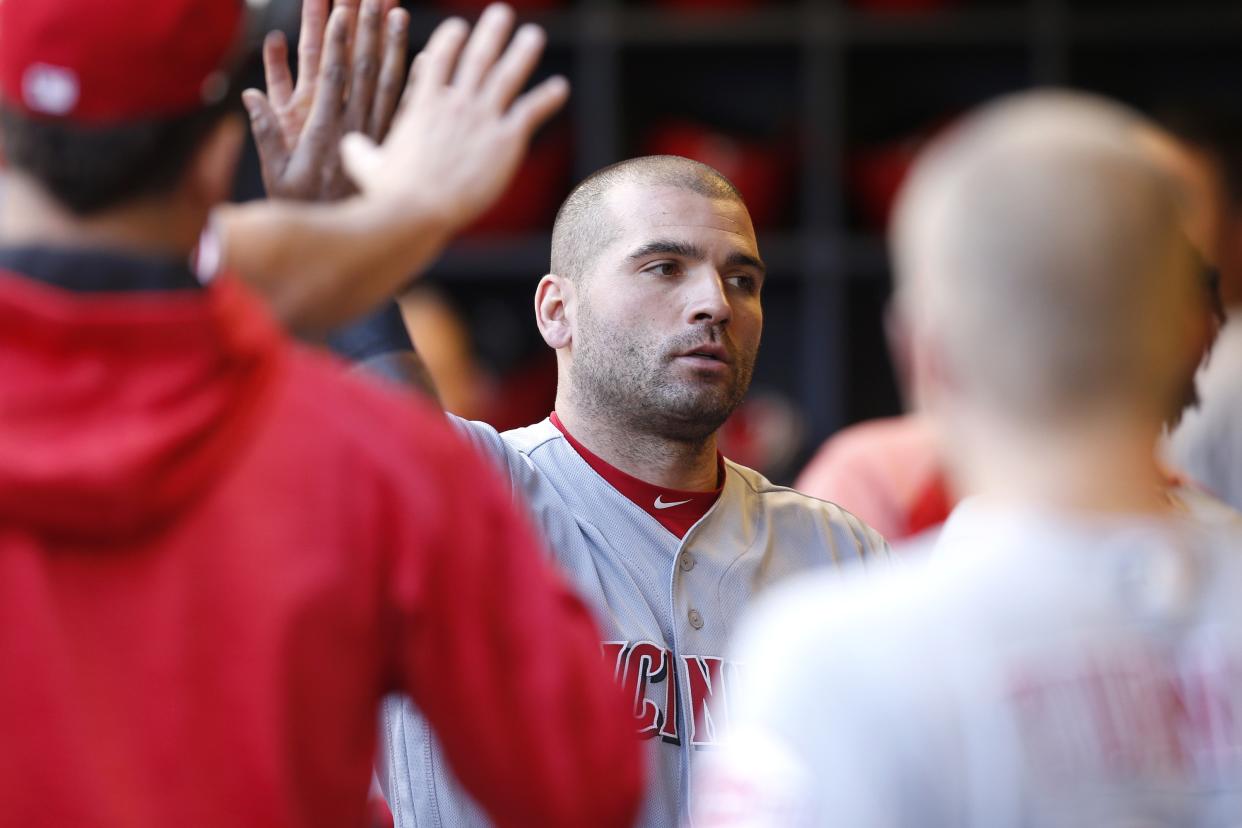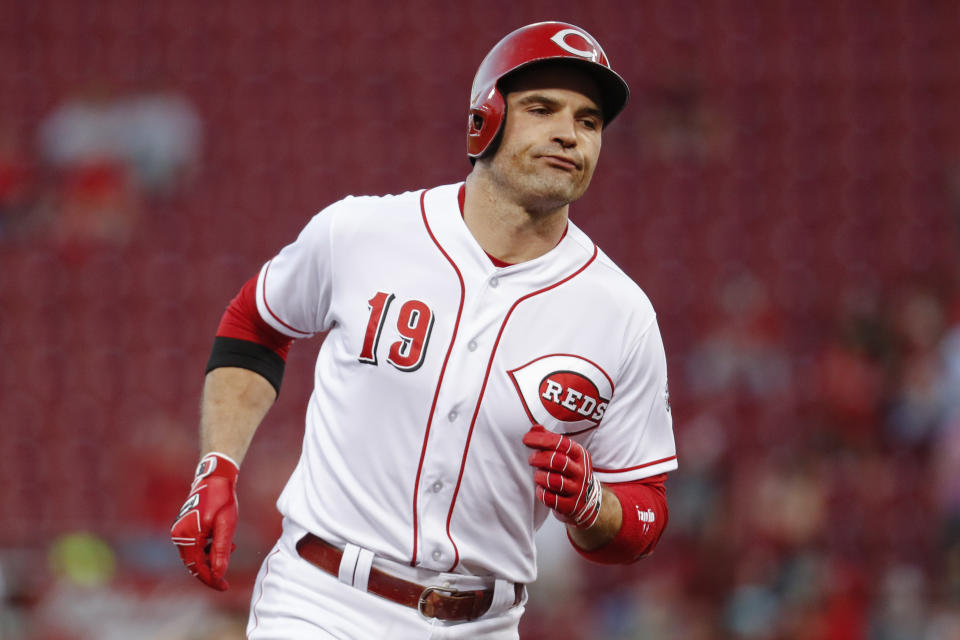Why Joey Votto deserves to win NL MVP

Joey Votto is not going to win the National League MVP award. This is a shame, because he was the best player in the NL this year, and those who still argue against most valuable and best being one and the same only end up tying themselves into logical knots of which sailors would be proud. As fine of a season as Giancarlo Stanton turned in, as wonderful a player as Paul Goldschmidt is, Votto was better, and even in these times of smarter and more educated writers and fans, he’s going to get hosed.
Consider the previous paragraph 10 percent reverse jinx and 90 percent lament. The same fear was espoused about Mike Trout last season, and he ran away with the American League MVP. He was also clearly a cut above his competitors. Votto’s advantage isn’t nearly as distinct, and yet the argument in his favor can be made with a single number and buttressed by a few others.
Let’s first flash back 15 years, because it’s important to establish a foundational element. In “Moneyball,” the Oakland A’s bought into a notion that today seems plainly obvious but then felt all sorts of revolutionary: getting on base, whether it’s via hit or walk, matters more than anything. The object of a baseball game is to score runs. The only way to score a run is to be on base. Ergo, the most valuable hitters almost always are the ones who get on base the most.
And that is why this number – 321 – matters. That’s how many times Votto got on base this season. The second-highest number in the NL was 288, from Charlie Blackmon. And then 272, from Kris Bryant. And Anthony Rizzo with 271. And Goldschmidt at 268. Followed by Stanton at 260.
Think about that. Particularly the last one. Stanton, the favorite for the award after his 59-home run, 132-RBI tour de force, was on base 61 fewer times than Votto. Sixty-one! The difference between Votto and Stanton was the difference between Stanton and Nomar Mazara. It means Votto gave the Cincinnati Reds 61 more scoring opportunities than Stanton did the Miami Marlins.
It’s not like getting on base 321 times is something that happens every season, either. It didn’t happen in 2016. Or 2015. Or in the 10 years before that. The last time a player reached base as many times as Votto did this year was Barry Bonds, who in 2004 was on an inconceivable 376 times – 232 via walk, 120 of those intentional.
Votto drew 20 intentional walks this season, which only underscores the fear of his bat. For all of Stanton’s thunder, Votto doesn’t stack up as some Punch-and-Judy slap hitter comparatively. He hit 36 home runs this season. His .578 slugging percentage ranked sixth in the league and trailed Stanton’s by 53 points. Stanton, meanwhile, was nearly 80 points back of Votto’s .454 on-base percentage – a far more important number.
The offensive numbers are indisputably in Votto’s favor, which leaves the other arguments against him. The worst concerns the Reds’ mediocrity. Every year in which the best player in either league hails from a non-playoff team, these words bear repeating, enough so that each deserves its own sentence. Do. Not. Judge. A. Player. Based. On. His. Teammates.

It is so obvious as to not even merit discussion, and yet the same voices bleat out every awards season that the MVP should come from a winning team. So here goes: The argument that games played by those on poor teams lack import sneers at the very notion of competitiveness, as if Votto, his 24 teammates and the other 475 players on non-playoff teams somehow exist in this alternative universe where their 162 matter less. Every game Votto plays oozes with urgency because the moment he stops treating them that way is the moment he loses his edge, his place, his purpose. Calling Votto’s games trivial because they lack playoff implications – because those 24 teammates he had no hand in choosing or deploying simply were not as good as he was – spits at the very things Votto did achieve.
This is not to say he should get more credit in MVP balloting because he managed to stand out as much as he did amid the slog of a season whose purpose did not include an extra month of baseball. It’s more an acknowledgment that every player is dealt a particular hand, and how he plays that hand should be the sole determinant in how he is judged.
Anyway, with Stanton the favorite despite playing on the moribund Marlins, that in and of itself torpedoes the bad-team argument. The best against Votto relates to the position he plays and the general value it imputes. First basemen, as a rule, are the least-valuable position on the field, mainly because the lack of what they provide compared to other positions. This does not make first basemen worthless. It simply holds them to a higher standard because the position is considered the easiest among the eight regular fielders. They don’t run and catch like outfielders. They don’t range and throw like infielders. They occasionally field a groundball or scoop a bad throw. Mostly, they catch balls anyone could.
Votto, it turns out, is a really good first baseman. Scouts say this. Defensive metrics agree. And so while he deserves to get dinged for playing first base, it’s not like Stanton is Mookie Betts in right field. He brings more value than Votto defensively, but the difference isn’t startling.
Also hurting Votto’s case, at least among the analytical set, is his baserunning. FanGraphs pegged him as the single worst baserunner in the major leagues this season, based on a number of factors, ranging from his success on stolen bases to the number of times he took an extra base. The latter cratered his number. Votto, according to Baseball Reference, advanced from first to third on a single or first to home on a double just 11 percent of the time in 2017. That is not good. It also doesn’t take into account how many of those hits, for example, went to left field and made an effort to advance wrongheaded.
Among scouts, Votto is regarded as a slightly below-average baserunner, mainly because of his lack of speed. He is not considered stupid or foolhardy; he was thrown out on the basepaths seven times this season, which does not scream worst baserunner in the game. Coming into this season, his past baserunning numbers didn’t have him there, either. He wasn’t good. He just wasn’t awful.
And so while it would be wrong to discount the numbers because they don’t dovetail with the narrative, it likewise would be wrong to take numbers that do not take into account the entire situation at face value. It seems fair to settle at this: Votto was not a good baserunner in 2017. It’s also entirely possible – and actually quite probable, based on his history and the lack of a demonstrable change in his running speed – that he wasn’t the worst, either.
So we’re left with a player who clearly was the best offensively in the league and wondering whether his fielding and running demerits do enough to spoil his candidacy. Whether a hitter who walked 134 times and struck out just 83, in an era where hitters are striking out more than ever, should not win an award because his teammates gave up more runs, home runs and walks than their 14 NL counterparts. Whether the best player in the league can win an award that exists to honor the best player in the league.
The answers all lead to an identical conclusion: Joey Votto deserves to win NL MVP. If only the 30 voters saw it the same way.
More MLB coverage from Yahoo Sports:


